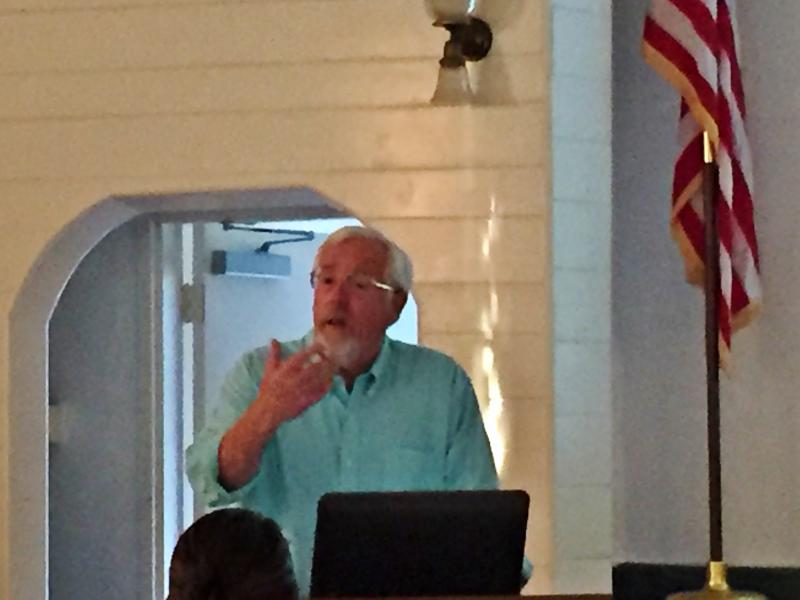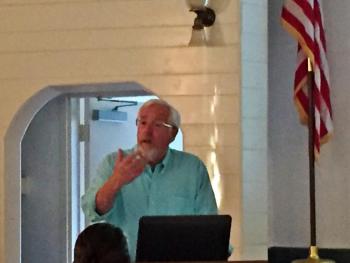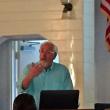Grandfather’s sea tales open Maine Coast Stone Symposium
John H. Anderson shared the work he had done to transcribe 3o years of his grandfather’s journals and family stories in his recently completed book during the first official event of the Maine Coast Stone Symposium at Boothbay Railway Village on Aug. 3.
The lecture was held in the former Boothbay Town Hall at the musuem.
Anders Anderson was born in 1864, the eldest son of an eldest son, in Sweden. His family owned a farm, and the young Anderson would have expected to inherit everything and live the comfortable life of a gentleman farmer. But economic upheaval hit Sweden when Anders was a teenager, and he heard the siren song of the Baltic Sea, only a few miles away from his home. During this period, a quarter of Sweden’s population emigrated, mostly to the United States, drawn by the promise of free farmland for those willing to work it. Anderson joined up as a junior sailor and soon had to prove himself. In Anderson’s first year at sea, his father died unexpectedly, and his family fortunes reversed. He was soon sending his pay home to his mother and younger brothers and sisters.
Anderson crossed the Atlantic Ocean 11 times, survived four shipwrecks, helped a ship pull itself together after the captain shot himself in the heart, got left behind while suffering from a tropical illness and ultimately decided to emigrate to Australia and become a sheep farmer.
When he got to London to find a ship to Australia, he couldn’t find one. He did, however, find one heading to New Brunswick, so he signed up as a sailor and headed west.
It wasn’t an easy crossing – the journals refer to a 50-day crossing in rough seas, and Anderson wasn’t too fond of the captain, either. When they finally docked in St. John, he fled the ship at midnight and went south to Maine.
He spent a couple of years working in the granite quarries, then became an Atlantic Coast captain, working for numerous companies on several schooners, often carrying granite south to New York and coal north to Maine. He did other runs, too – some to the Caribbean, carrying tropical fruits, molasses and other materials.
Along the way, he found time to fall in love and marry Annie Gilley, the daughter of a lighthouse keeper. The couple had six children.
He also brought over some of his family members from Sweden, including at least one brother and one sister. He put them through college.
The harrowing stories of the shipwrecks he survived included a broadside ramming by a schooner off the coast of Chatham, Massachusetts, and a grounding off an uninhabited island near Deer Isle. A ship sank within three minutes, but all hands were saved. In another wreck, the hands ended up in a lifeboat and came within nine miles of New Jersey, but the winds changed and they drifted out to sea and were picked up by a banana boat when they were dehydrated and starving. The crew fed them small amounts as they slowly recovered, but they went exploring and found the bananas. A family story that came down tells that Anderson never let a banana into his house, ever again.
He took Annie and the children with him occasionally, and took John – his youngest grandson’s father – with him regularly. “This is my favorite photo,” Anderson said. “I am looking over my father’s shoulder at my grandfather, who is at the ship’s wheel.”
“Eighty-five summers ago, my grandfather moved the last two granite schooners from Boothbay to St. George, where they went into mothballs,” Anderson said. The great era of Atlantic coastal sailing was over; Anderson retired and got interested in other things. At 69, he learned to drive an automobile; he was interested in planes and followed the Lindbergh story closely. He spent time with his captain friends at their camps and watched as, all around him, the relics of his former trade literally fell apart in coves up and down the Maine coast. No effort was made to preserve them, except as curiosities.
But Anderson said his grandfather was not bitter. “He embraced the future. He encouraged his sons to qualify as diesel captains. Steam engines were the future.”
As for Anderson, though, his life was in sailing. He didn’t want to go back to sea in a diesel ship.
In the last year of his life, he put his life and house in order. Anderson knew he had an incurable illness; he worked on the house for his Annie and made sure she had plenty of fuel for the winter; he got to know one of his granddaughters and taught her the names of his “chickings”; and he put together all the papers he still had that his unborn grandson, John R. Anderson, would use to tell his life’s story. Some of his journals were lost in the shipwrecks.
Anderson is hoping soon to publish the story of his grandfather’s remarkable life. For now, he finds the stories and his grandfather’s 100-year-old words as amazing as the audience did.
Event Date
Address
United States

























